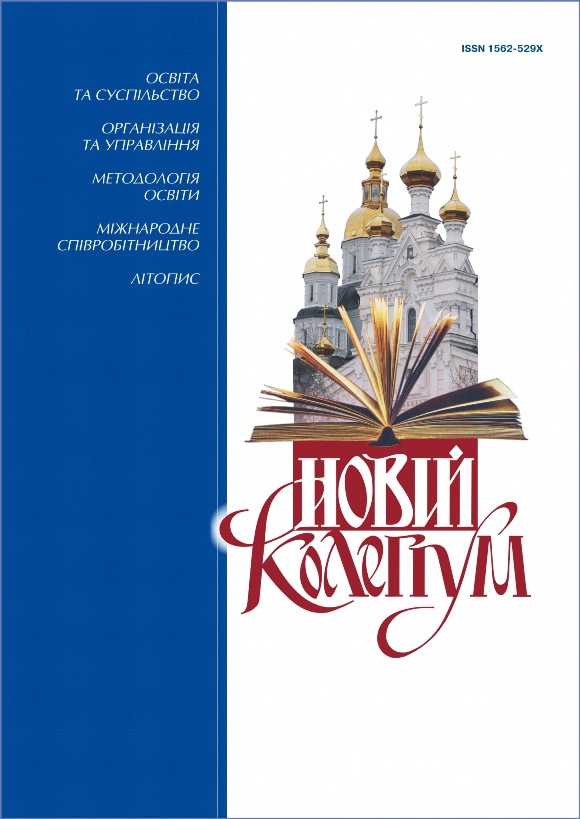Alternative practice as a source of formation of professional competence of the future socio-cultural sphere manager
DOI:
https://doi.org/10.30837/nc.2021.3.11Keywords:
practical training of the student, alternative practice, Distance Learning, types of practical trainingAbstract
The socio-cultural sphere and its institutions ensure the development of the cultural heritage of the peoples, as well as the human resources of the industry itself in the difficult situation of today. However, any identified problems often turn into the basis for the formation of something new that can create the latest superstructures for the development of organizations, society as a whole. Such a problem is the organization under the current conditions of practical training of future managers of the socio-cultural sphere.
The purpose of our study is to identify the essence, structure and objectives of alternative practice as a type of practical training of a specialist in the socio-cultural sphere, able to ensure the proper formation of his professional competencies.
We propose to define alternative student practice as a type of practical training in which the student undergoes it in a timely manner in related (profile or non-core) organizations, at the place of residence or at the department, in full-time and / or distance, pre-approved programs and to the tasks under the guidance of teachers of the department.
Features of the organization and conduct of an alternative type of practice involve the development of an appropriate program that takes into account the conditions of its passage and includes the use of remote work. At the same time, the department develops its own "Work Plan" for alternative practice. During the first working week, "Individual schedules" of internships for each student are formed.
For quality work of participants of the work process of alternative practice, the specialists of the department organize training courses, lectures, master classes, etc. where the following topics can be considered: organization of educational activities in the remote mode; organization of communications in the conditions of remote access; organizational and psychological prerequisites for job transfer; social communications; prevention of negative effects of remote work; support of mental (sometimes physical) health; lectures, professional master classes. To control and support the work of students during the internship, an application "Electronic Diary" is being developed, which is placed on the existing distance learning platform.
The content of tasks and projected competencies are formed in accordance with the academic requirements of the academic level. In particular, introductory practice is carried out in the first year; on the second – educational practice; on the third – production and so on. All the work of students and practice leaders during its implementation throughout the period is monitored and monitored on an electronic platform used by the university or teacher. Work plans, diary supplements, weekly reports from practice leaders, etc. can be posted on an online platform with access to work verification.
Thus, in the event of a pandemic or other global or regional shocks, practical training of students can be carried out through the use of alternative student practice as a special type of practical training, in which the student undergoes it in a timely manner in cultural organizations, places of residence or department, in full-time and / or distance form, according to the approved programs under the guidance of teachers of the department. In this case, the evolution of professional competence will be in accordance with the hierarchy of tasks that are formed on the basis of acquired knowledge at each stage of training and through ensuring the quality of work of participants in the work process of alternative practice.
References
Шевчук Т.В., Сідельник О.П. Практична підготовка студентів вищих навчальних закладів як невід’ємна детермінанта формування їхніх професійних компетенцій // Наук. вісник НЛТУ України. Серія економічна. 2017. Вип. 27, № 2. С. 189-193.
Щука Г.П. Організація практичної підготовки майбутніх фахівців туристичної індустрії // Вісник ЛНУ ім. Тараса Шевченка. 2010. № 16(203). С. 117–125.
Дзіковська М. І. Організація практичної підготовки майбутніх фахівців природничих спеціальностей у коледжі // Молодий вчений. 2018. № 3 (55). С. 84-89.
Чебукіна В. A. Особливості організації практичної підготовки фахівців у вищих навчальних закладах І-ІІ рівня акредитації // Інформаційні технології в освіті, науці та виробництві. 2013. Вип. 3(4). С. 204-210.
Дроздова Ю. В. Проблеми сучасної психології // Зб. наук. праць К-ПНУ імені Івана Огієнка, Ін-ту психології імені Г.С. Костюка НАПН України. 2017. Вип. 37. С. 86-97.
Корольчук В., Дроздова Ю. Теоретичні основи розвитку професійного самовизначення майбутніх фахівців торговельного підприємства // Актуальні проблеми наукового й освітнього простору в умовах поглиблення євроінтеграційних процесів : зб. тез доповідей Міжнар. наук.-практ. конф., 14 – 15 травня 2015 р., Т. 2. Мукачево : Карпатська вежа, 2015. 361с.
Apple M. W. Markets, Standards, Teaching, and Teacher Education. 2001. https://doi.org/10.1177/0022487101052003002.
Beach D., Bagley C. Changing professional discourses in teacher education policy back towards a training paradigm: a comparative study // European Journal of Teacher Education. 2013. Vol. 36, Is. 4. https://doi.org/10.1080/02619768.2013.815162.

